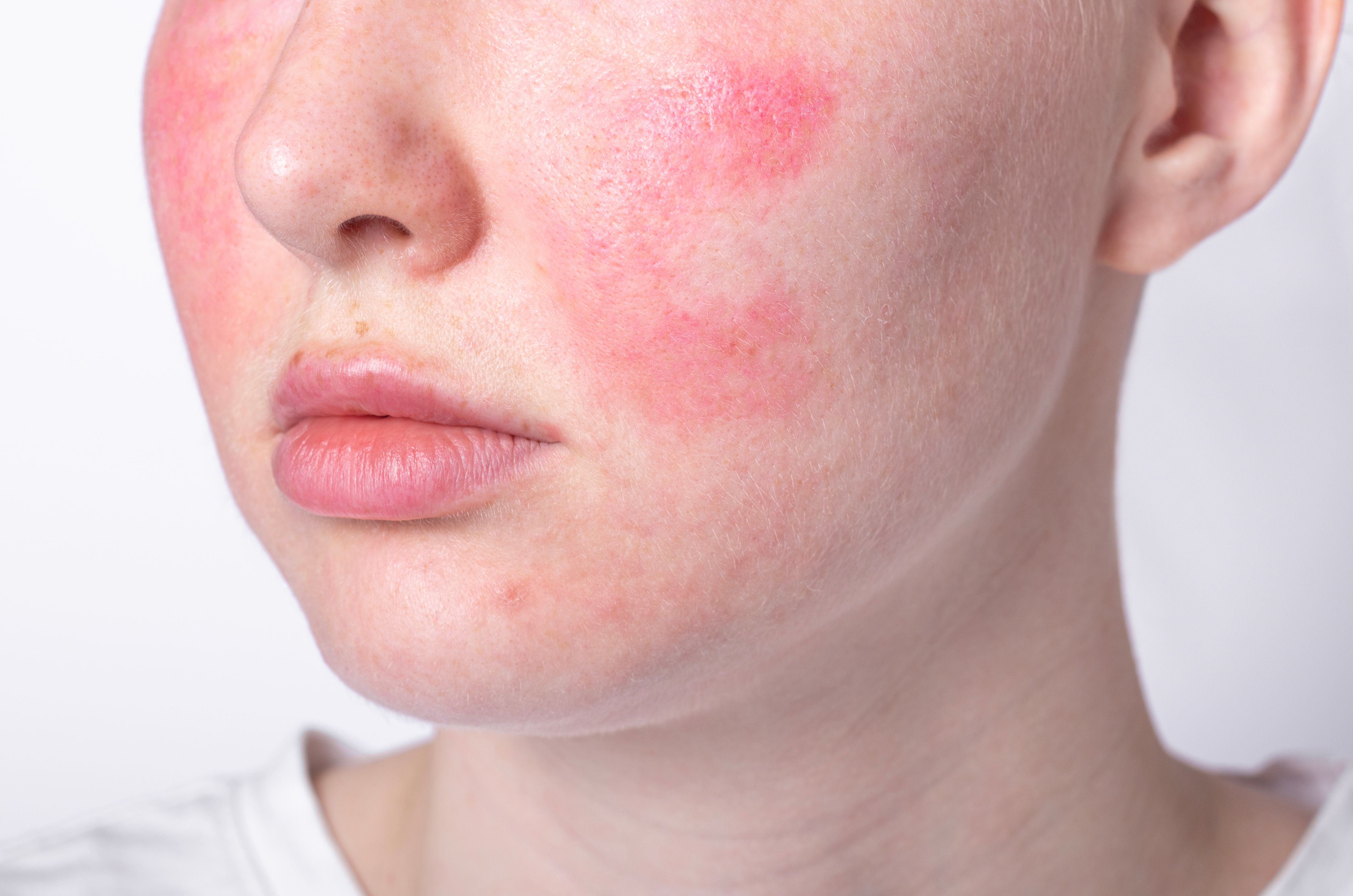- Acne
- Actinic Keratosis
- Aesthetics
- Alopecia
- Atopic Dermatitis
- Buy-and-Bill
- COVID-19
- Case-Based Roundtable
- Chronic Hand Eczema
- Chronic Spontaneous Urticaria
- Drug Watch
- Eczema
- General Dermatology
- Hidradenitis Suppurativa
- Melasma
- NP and PA
- Pediatric Dermatology
- Pigmentary Disorders
- Practice Management
- Precision Medicine and Biologics
- Prurigo Nodularis
- Psoriasis
- Psoriatic Arthritis
- Rare Disease
- Rosacea
- Skin Cancer
- Vitiligo
- Wound Care
Article
More evidence of rosacea, autoimmune link
Author(s):
While a cause-and-effect link is elusive, it’s possible that environmental and lifestyle factors could explain why rosacea patients appear to suffer more from various conditions. But recent genetic research has hinted at inherited links between rosacea and autoimmune disorders. Recent findings provide more evidence.
Female rosacea patients have higher rates of autoimmune disorders including type 1 diabetes, celiac disease, multiple sclerosis and rheumatoid arthritis. Men, with rosacea, however, were only more likely to suffer from rheumatoid arthritis, according to a recent study.
The findings, published Jan. 30 in the Journal of the American Academy of Dermatology, provide more evidence of a link between rosacea and autoimmune disorders.
“Rosacea may be a marker for autoimmune disease,” says study lead author Alexander Egeberg, M.D., Ph.D., who works in Denmark at the Department of Dermato-Allergology at the University of Copenhagen’s Herlev and Gentofte Hospital.
According to the study, there’s little understanding about rosacea’s connections to other illnesses. Still, it’s been linked to conditions like heart disease, depression, migraines, high blood pressure and high cholesterol.
A unique health burden
Anecdotal evidence also hints that rosacea patients face a unique health burden.
“At our hospital department we noticed that our patients with rosacea frequently suffer from other conditions, in particular autoimmune disease,” Dr. Egeberg says.
A cause-and-effect link is elusive, so it’s possible that environmental and lifestyle factors could explain why rosacea patients appear to suffer more from various conditions. But recent genetic research has hinted at inherited links between rosacea and autoimmune disorders.
“Very recently, a genome-wide association study found shared genetic risk loci in type 1 diabetes mellitus and celiac disease,” Dr. Egeberg says. And research suggests that rosacea, rheumatoid arthritis and multiple sclerosis may also be linked genetically.
To gain better insight into possible rosacea links to other conditions, the researchers tracked 6,759 rosacea patients in Denmark and matched them by age, sex and calendar time to 33,795 healthy control subjects.
The average age of the patients (all treated between 1997 and 2011) and the control subjects was 40. Women made up 63% of both samples; about 9% were smokers.
The researchers adjusted their statistics so they wouldn’t be thrown off by smoking or socioeconomic status. According to their odds ratio calculations, patients with rosacea had significantly increased risk of type 1 diabetes (OR 2.59, 95% CI 1.41-4.73), celiac disease (OR 2.03, 95% CI 1.35-3.07), multiple sclerosis (OR 1.65, 95% CI 1.20-2.28), and rheumatoid arthritis (OR 2.14, 95% CI 1.82-2.52).
However, “it is unclear if the association is limited to certain rosacea subtypes,” Dr. Egeberg says. Also, men only showed a statistically significant higher risk of rheumatoid arthritis. Another analysis uncovered a significant link between rosacea and celiac disease in men.
NEXT: Thoughts on a gender gap
Thoughts on the gender gap
What might explain the gender gap that appears to make female rosacea patients more vulnerable to autoimmune illness?
“In the same way that rosacea is more frequent in women, increased female susceptibility to autoimmune diseases is widely recognized,” Dr. Egeberg says. “It may depend on estrogenic hormones and sex chromosome abnormalities.”
How can the study findings be useful? “The link with autoimmune disease may enable early detection and treatment of underlying illness,” Dr. Egeberg says. “Moreover, it is well-established that early and aggressive treatment of multiple sclerosis and rheumatoid arthritis are associated with a milder disease course.”
Fortunately for patients, some medications may be helpful to treat both rosacea and autoimmune conditions too. “Meta-analyses have demonstrated that tetracyclines, in particular minocycline, are associated with a significant improvement in disease activity in rheumatoid arthritis,” he says. “And clinical trials have shown that doxycycline combination with beta-interferon is effective in treatment of multiple sclerosis.”
What’s next? “Researchers from the U.S. have recently suggested a link between rosacea and inflammatory bowel disease,” Dr. Egeberg says, and it will be interesting to see if rosacea is associated with other autoimmune diseases as well.”
Newsletter
Like what you’re reading? Subscribe to Dermatology Times for weekly updates on therapies, innovations, and real-world practice tips.














